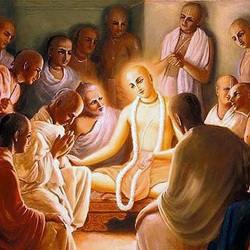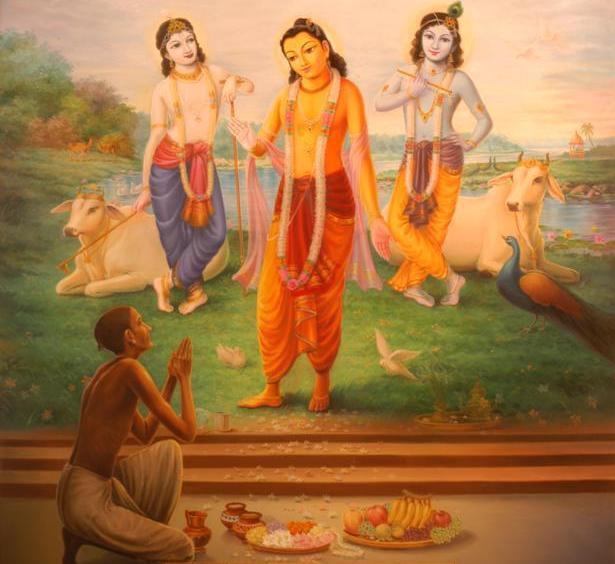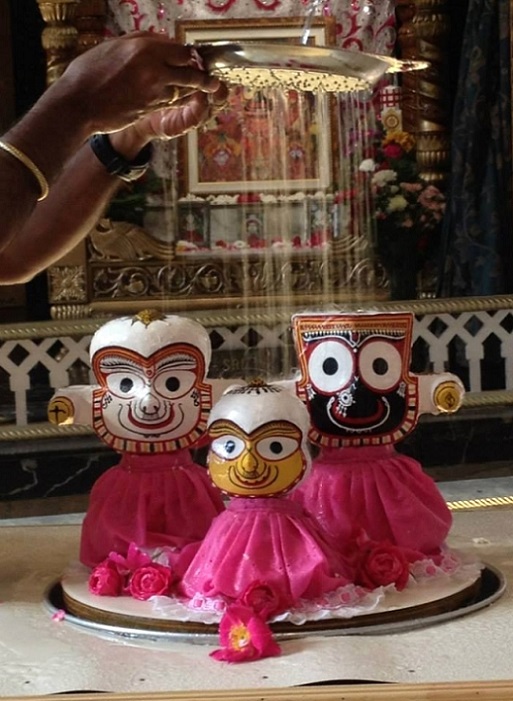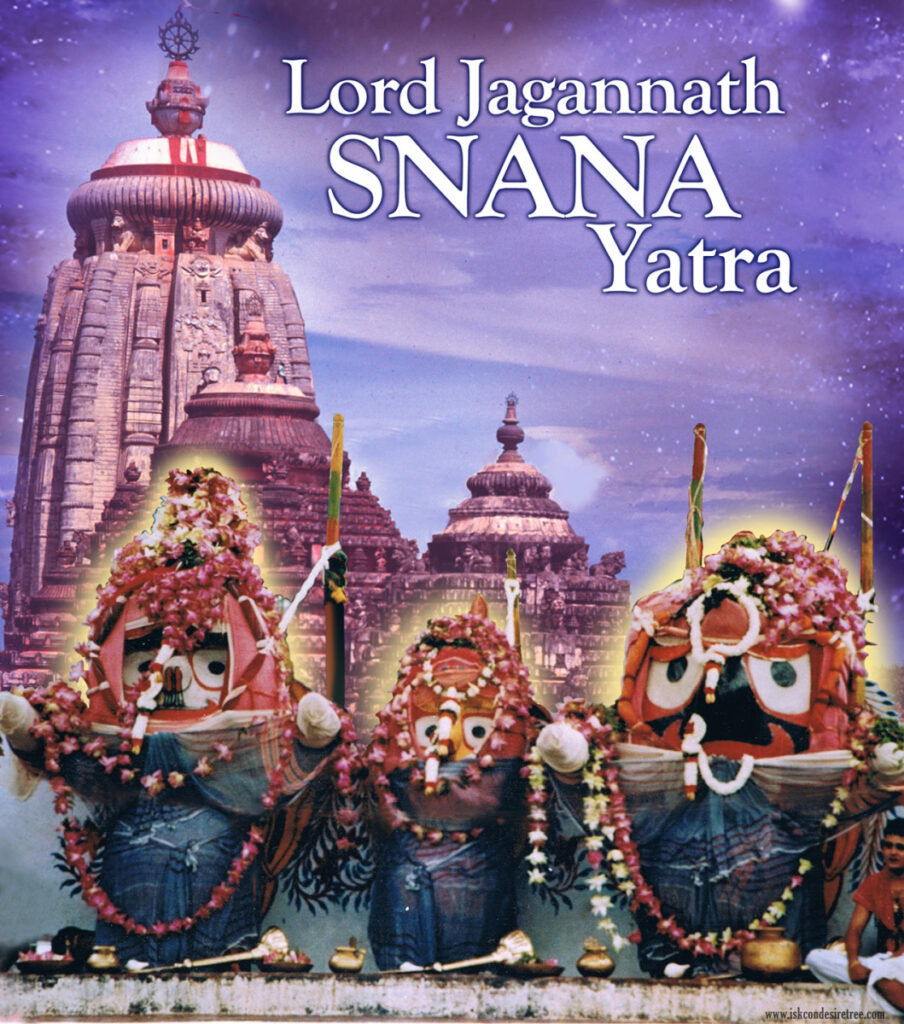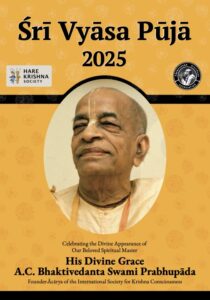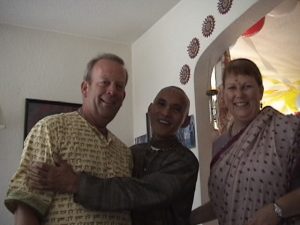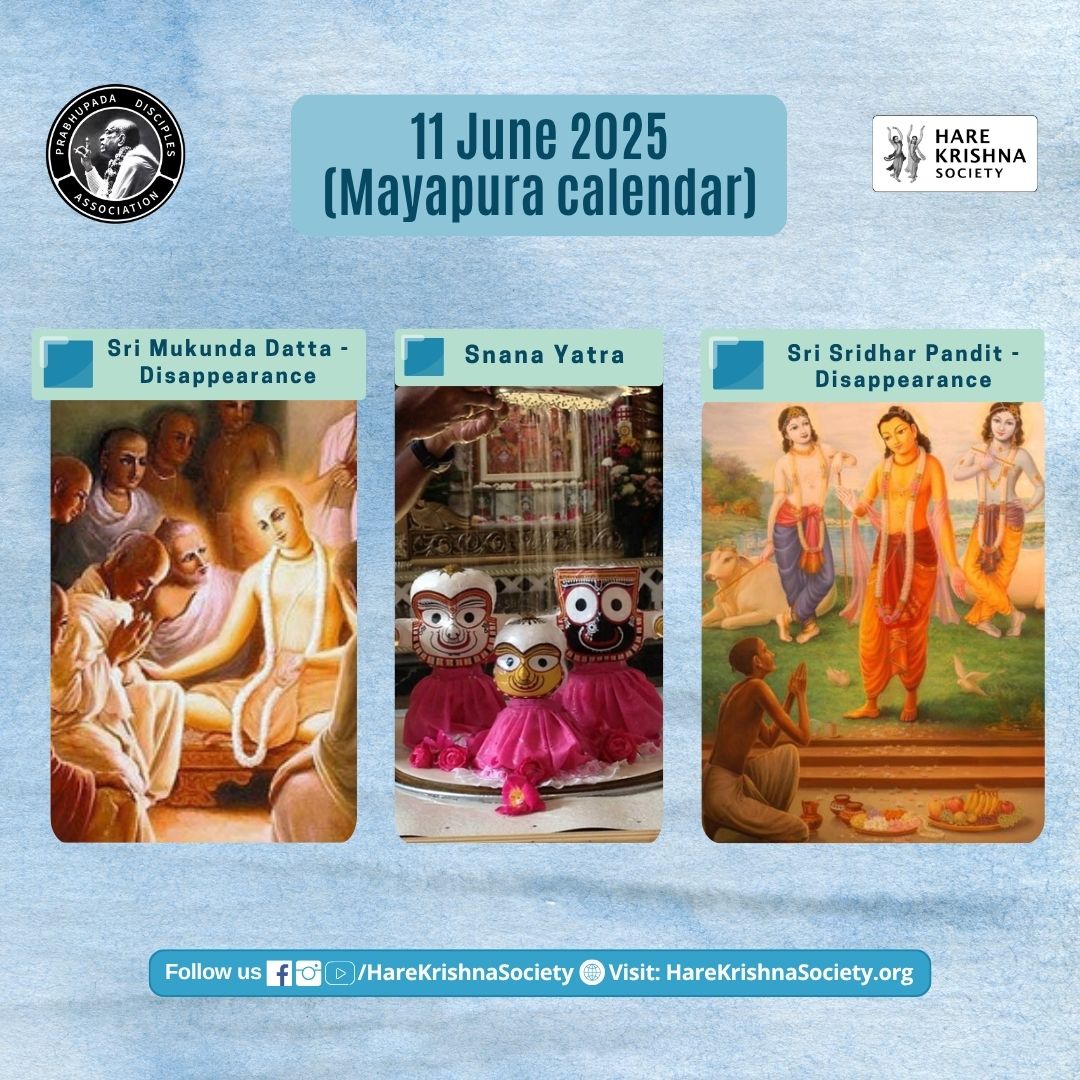
Wednesday, 11 June 2025 [Mayapur, West Bengal, India Time]
Snana Yatra – Bathing Ceremony of Lord Jagannatha
Disappearance Day of Sri Mukunda Datta
Disappearance Day of Sri Sridhar Pandit
Snana Yatra – Bathing Ceremony of Lord Jagannatha
Śrīla Prabhupāda:
“Lord Jagannātha has a number of stalwart servants known as dayitās. These servants do not come from very high-caste families (brāhmaṇas, kṣatriyas or vaiśyas), but because they are engaged in the service of the Lord, they have been elevated to a respected position. Thus they are known as dayitās. These servants of Lord Jagannātha take care of the Lord from the day of the Snāna-yātrā up to the time the Lord is carried from the throne to the Ratha car.
In the Kṣetra-māhātmya these dayitās are said to come from the śabaras, a caste that keeps and sells pigs. However, among the dayitās there are also many who come from the brāhmaṇa caste. Those dayitās coming from the brāhmaṇa families are called dayitā-patis, or leaders of the dayitās.
The dayitā-patis offer food such as sweetmeats to Lord Jagannātha during the anavasara, the resting period after Snāna-yātrā. They also make the early morning offering of sweetmeats daily. It is said that during the anavasara Lord Jagannātha suffers from fever and that the dayitā-patis offer Him an infusion of drugs represented by fruit juice. It is said that in the beginning Lord Jagannātha was worshiped by the śabaras and was known as the Deity Nīla Mādhava. Later, when the Deity was established in the temple, the Lord became known as Jagannātha. Because the Deities were taken from the śabaras, all the śabara devotees were elevated to the position of dayitās.”
(Śrī Caitanya-caritāmṛta, Madhya-līlā 13.8, Purport | 1974 Edition)
Śrīla Prabhupāda:
“The word anavasara is used when Śrī Jagannāthajī cannot be seen in the temple. After the bathing ceremony (snāna-yātrā), Lord Jagannātha is supposed to become sick. He is therefore removed to His private apartment, where no one can see Him. Actually, during this period renovations are made on the body of the Jagannātha Deity. This is called nava-yauvana. During the Ratha-yātrā ceremony, Lord Jagannātha once again comes before the public. Thus for fifteen days after the bathing ceremony, Lord Jagannātha is not visible to any visitors.”
(Śrī Caitanya-caritāmṛta, Madhya-līlā 1.122, Purport | 1975 Edition)
Read More: https://harekrishnasociety.org/?p=30197
Disappearance Day of Sri Mukunda Datta
Śrīla Prabhupāda:
“Śrī Mukunda Datta was born in the Caṭṭagrāma district, in the village of Chanharā, which is under the jurisdiction of the police station named Paṭiyā. This village is situated ten krośas, or about twenty miles, from the home of Puṇḍarīka Vidyānidhi.
In the Gaura-gaṇoddeśa-dīpikā (140) it is said:
vraje sthitau gāyakau yau
madhukaṇṭha-madhuvratau
mukunda-vāsudevau tau
dattau gaurāṅga-gāyakau
“In Vraja there were two very nice singers named Madhukaṇṭha and Madhuvrata. They appeared in caitanya-līlā as Mukunda and Vāsudeva Datta, who were singers in the society of Lord Caitanya Mahāprabhu.”
When Lord Caitanya was a student, Mukunda Datta was His class friend, and they frequently engaged in logical arguments. Sometimes Lord Caitanya Mahāprabhu would fight with Mukunda Datta, using tricks of logic. This is described in the Caitanya-bhāgavata, Ādi-līlā, Chapters Seven and Eight.
When Lord Caitanya Mahāprabhu returned from Gayā, Mukunda Datta gave Him pleasure by reciting verses from Śrīmad-Bhāgavatam about Kṛṣṇa-līlā. It was by his endeavor that Gadādhara Paṇḍita Gosvāmī became a disciple of Puṇḍarīka Vidyānidhi, as stated in Madhya-līlā, Chapter Seven. When Mukunda Datta sang in the courtyard of Śrīvāsa Prabhu, Mahāprabhu danced with his singing, and when Lord Caitanya for twenty-one hours exhibited an ecstatic manifestation known as sāta-prahariyā, Mukunda Datta inaugurated the function by singing.”
(Śrī Caitanya-caritāmṛta, Ādi-līlā 10.40, Purport | 1973 Edition)
Read More: https://harekrishnasociety.org/?p=30201
Disappearance Day of Sri Sridhar Pandit
Śrīla Prabhupāda:
“In the Caitanya-bhāgavata it is said:
kholāvecā sevakera dekha bhāgya-sīmā
brahmā śiva kāṅde yāra dekhiyā mahimā
dhane jane pāṇḍitye kṛṣṇa nāhi pāi
kevala bhaktira vaśa caitanya-gosāñi
“Behold the great fortune of the devotee Kholāvecā. Lord Brahmā and Śiva shed tears upon seeing his greatness. One cannot attain Lord Kṛṣṇa by any amount of wealth, followers, or learning. Śrī Caitanya Mahāprabhu is controlled only by pure devotion.”
Lord Śrī Caitanya Mahāprabhu had a very sincere devotee whose name was Kholāvecā Śrīdhara and whose only business was to sell pots made of the skin of banana trees. Whatever income he had, he used fifty percent for the worship of mother Ganges, and with the other fifty percent he provided for his necessities.
On the whole, he was so very poor that he lived in a cottage that had a broken roof with many holes in it. He could not afford brass utensils, and therefore he drank water from an iron pot. Nevertheless, he was a great devotee of Lord Śrī Caitanya Mahāprabhu. He is a typical example of how a poor man with no material possessions can become a most exalted devotee of the Lord. The conclusion is that one cannot attain shelter at the lotus feet of Lord Kṛṣṇa or Śrī Caitanya Gosāñi through material opulence; that shelter is attainable only by pure devotional service.”
(Śrīmad-Bhāgavatam 5.19.7, Purport | 1975 Edition)
Read More: https://harekrishnasociety.org/?p=12952
Hare Krishna
